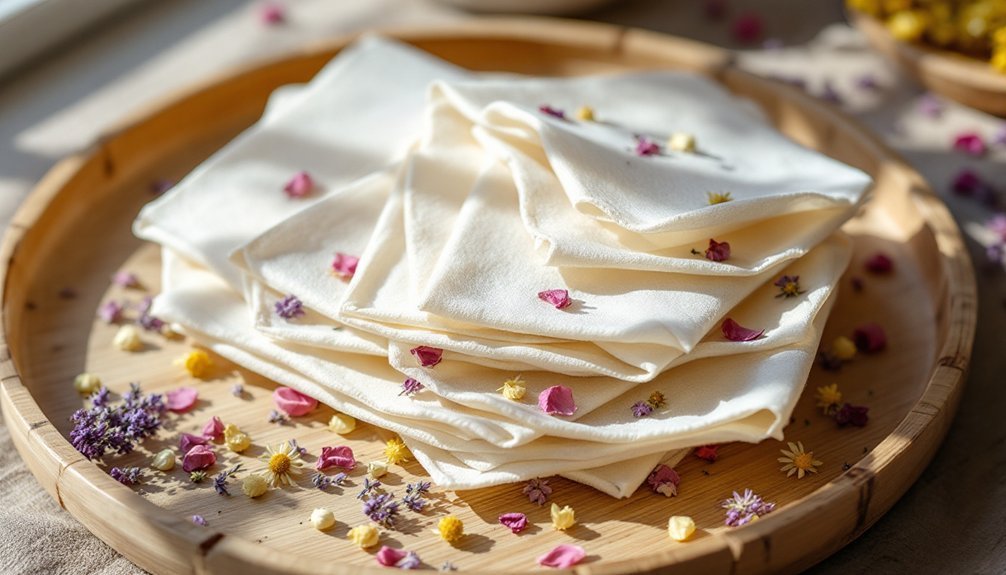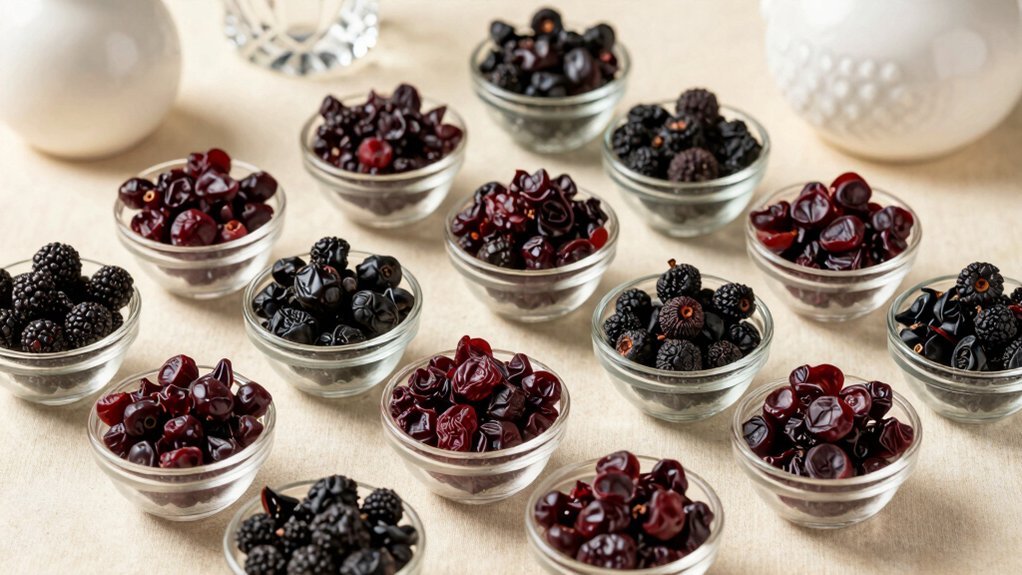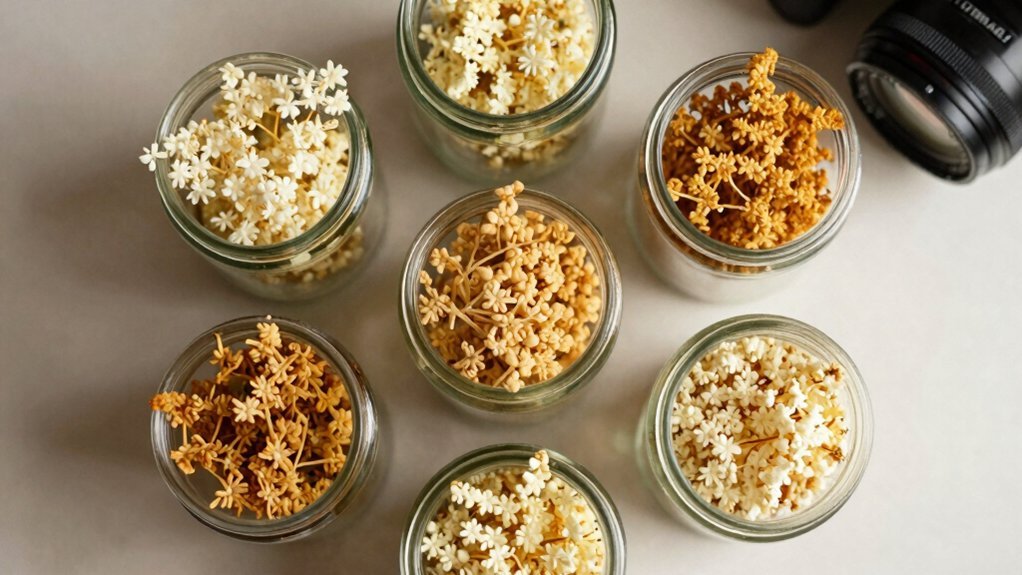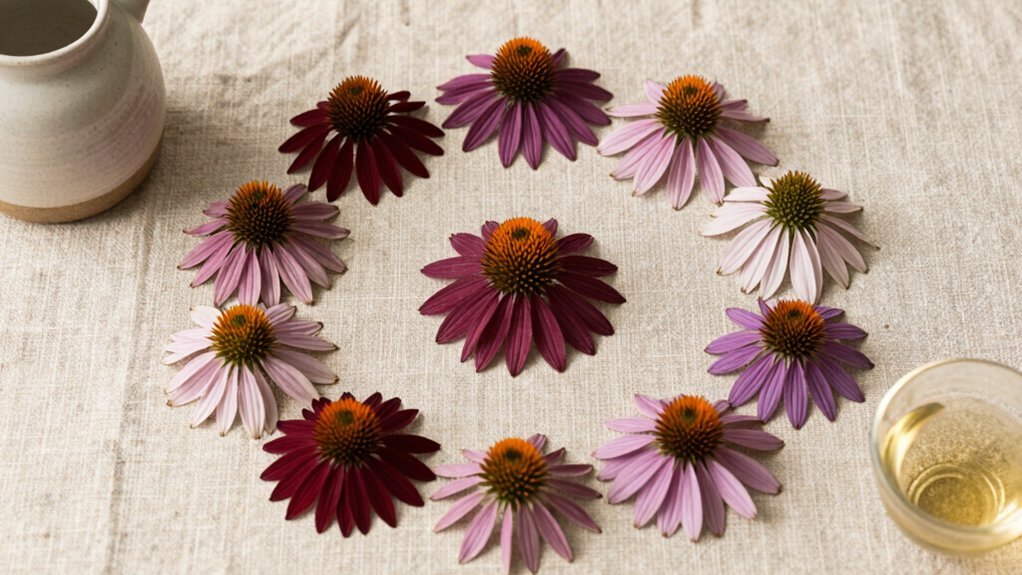If you're passionate about crafting your own herbal tea blends, you'll need the right biodegradable filters to complement your efforts. While many tea enthusiasts focus solely on sourcing quality herbs and botanicals, the filter you choose can make or break your brewing experience. From unbleached wood pulp options to innovative corn starch-derived materials, today's eco-friendly tea filters offer both functionality and environmental consciousness. Let's explore the top five choices that'll elevate your tea-making ritual.
Eco-Fil Disposable Tea Filter Bags for Loose Tea (100 Pack)
Tea enthusiasts seeking an eco-conscious brewing solution will find their match in Eco-Fil's disposable tea filters. Made from unbleached wood pulp, these biodegradable and compostable bags offer excellent permeability while keeping tea particles contained.
You'll appreciate their versatility – they're sturdy enough for microwave and pressure cooker use, perfect for loose tea, coffee, herbs, and even bath soaks. At 3.2×4.0 inches, each bag provides ample space for your favorite blends. With over 9,000 satisfied customers rating them 4.6/5 stars, these filters deliver on their promise of mess-free brewing. Store them in a cool, dry place to maintain their quality.
Best For: Loose tea enthusiasts who value eco-friendly products and want a convenient, mess-free brewing experience without compromising on taste quality.
Pros:
- Environmentally conscious design with biodegradable and compostable materials
- Versatile usage beyond tea, including coffee, herbs, bath soaks, and other applications
- Strong durability allowing for microwave and pressure cooker use while maintaining excellent filtration
Cons:
- Single-use design, though some users report multiple steeps with careful handling
- More expensive than traditional tea bags when used frequently
- Requires proper storage in cool, dry place to maintain quality
100 Pcs Disposable Tea Bags for Loose Leaf Tea
Whether you're a loose leaf tea enthusiast or someone who enjoys crafting custom herbal blends, these 100-piece disposable tea filter bags offer a convenient and eco-conscious solution. Made from corn starch-derived PLA, these 3.54 x 2.75-inch bags feature an ultra-thin mesh that guarantees ideal water flow while keeping leaves contained.
You'll appreciate the practical drawstring design that makes filling and sealing effortless. They're versatile enough for tea, coffee, spices, and even foot baths. Users consistently praise their durability and effectiveness, though you'll want to handle the strings gently. Best of all, these non-toxic, odorless filters are fully biodegradable and can enrich your garden soil when composted.
Best For: Tea and coffee enthusiasts who value convenience and eco-friendly options for brewing loose leaf teas, custom herbal blends, or cold brew coffee at home.
Pros:
- Biodegradable and eco-friendly material made from natural corn starch
- Convenient drawstring design makes filling and sealing simple
- Versatile use for tea, coffee, spices, herbs, and other applications
Cons:
- Drawstring may break if pulled too forcefully
- Size may be too large for single-cup brewing
- Thinner material might not be as durable as traditional paper tea bags
400 Pack Disposable Tea Filter Bags with Drawstring
Eco-conscious tea enthusiasts will appreciate this 400-pack of disposable drawstring filters that combines convenience with environmental responsibility. Made from natural wood pulp, these unbleached 7×9 cm bags undergo UV sterilization and infrared drying for safety.
You'll find these BEFORYOU filters versatile enough for loose tea, coffee, herbs, and even foot baths. The drawstring design keeps contents secure while steeping, and the filmy paper allows quick infusion without compromising flavor. While some users suggest longer steeping times, the bags effectively contain debris and eliminate the need for washing strainers. With over 2,600 positive reviews, they're a reliable choice for your daily brewing needs.
Best For: Tea and herbal drink enthusiasts who value convenience and eco-friendly products while wanting an easy, mess-free brewing experience.
Pros:
- Natural, unbleached wood pulp material with proper sterilization makes it a safe and eco-conscious choice
- Versatile usage beyond tea, including coffee, herbs, foot baths, and soup making
- Convenient drawstring design prevents spillage and makes removal easy
Cons:
- May require longer steeping times compared to traditional strainers
- Some users report slight muting of tea flavors
- Single-use nature creates more waste compared to reusable strainers
Tea Filter Bags with Drawstring for Loose Leaf Tea (100 Pack)
Natural wood pulp filters offer a convenient solution for loose leaf tea enthusiasts seeking both quality and sustainability. These 3.15 x 3.94-inch Tinkee bags make brewing your favorite teas effortless with their simple drawstring closure.
You'll appreciate how these biodegradable filters withstand high temperatures while allowing quick infusion of flavors. Their generous size accommodates various tea quantities, and you won't notice any paper taste affecting your brew. They're perfect for single servings, eliminating the need to clean traditional infusers. While they work best with tea, you can also use them for herbs and DIY scented blends. With 4.5 stars from over 9,000 users, they're a reliable choice for your tea-making routine.
Best For: Tea enthusiasts who want a convenient, eco-friendly way to brew single servings of loose leaf tea without the hassle of cleaning traditional infusers.
Pros:
- Large size (3.15 x 3.94 inches) accommodates various tea quantities and blend types
- Made from biodegradable wood pulp that doesn't affect tea taste
- Easy-to-use drawstring design makes filling and sealing simple
Cons:
- May be too fragile for coffee grounds
- Some users report inconsistent drawstring quality
- Higher price point compared to standard tea bags (#7,915 in Home & Kitchen ranking suggests moderate popularity)
200Pcs Disposable Tea Filter Bags for Loose Leaf Tea
Tea lovers seeking a convenient brewing solution will find these 200-piece disposable filters perfectly suited for their needs. Made from natural wood pulp paper, these 3.54 x 2.75-inch bags offer high permeability and heat resistance while preserving your tea's authentic flavor.
You'll appreciate the versatility of these filters, as they're ideal for loose-leaf tea, coffee, herbs, foot baths, and even soup preparation. The drawcord closure keeps contents secure during brewing. With a 4.5-star rating from 138 reviews, customers praise their ease of use and value, though some note the bags can be delicate. At just 2.89 ounces, these eco-friendly Gokyvei filters are both practical and environmentally conscious.
Best For: Tea enthusiasts who want a convenient, disposable solution for brewing loose-leaf teas and herbs while maintaining flavor quality.
Pros:
- Versatile use across multiple applications including tea, coffee, herbs, and foot baths
- Made from natural wood pulp paper that's environmentally friendly and preserves authentic flavor
- Strong value proposition with 200 bags and positive customer ratings
Cons:
- Some users report bags can be fragile and tear easily
- Drawstring closure may not always secure properly
- Made in China, which may concern some quality-conscious consumers
Factors to Consider When Choosing Biodegradable Tea Filters for DIY Herbal Tea Blends
When selecting biodegradable tea filters for your homemade herbal blends, you'll need to evaluate key factors like material safety, size requirements, and whether you prefer drawstring or standard options. You'll want to verify the filter material's heat resistance and guarantee it won't leach harmful substances into your tea at high temperatures. The filter's environmental impact matters too, so check that it's truly biodegradable and aligns with your eco-friendly goals.
Material Safety and Purity
Selecting safe and pure materials for your DIY herbal tea filters doesn't need to be complicated. You'll want to focus on unbleached filters made from natural sources like wood pulp or cornstarch to avoid unwanted chemicals in your brew. Look for certified compostable options that won't leave harmful residues behind.
Make sure your filters are non-toxic and odorless – this is essential since you don't want anything interfering with your herbal tea's natural flavors. Pay attention to the paper's permeability and heat resistance, as these properties affect how well your tea's flavors are extracted. Before purchasing, check the product specifications carefully to confirm there aren't any synthetic materials or additives present. These unwanted elements can compromise both the safety of your brewing process and the purity of your final tea blend.
Size and Capacity Needs
Finding the right size and capacity for biodegradable tea filters is essential for successful DIY herbal blending. You'll want to select filters that match your brewing requirements, with sizes typically ranging from 3.15 to 7 x 9 cm.
When you're creating custom blends, consider how much tea you'll brew at once. If you're mixing multiple herbs or crafting larger portions, opt for bigger filters that can accommodate your ingredients without overfilling. Look for bags with good permeability that'll let flavors infuse while keeping leaves contained. The drawstring feature is particularly helpful for securing your blend, especially when you're working with larger quantities.
Remember to check that your chosen filter size allows proper expansion of the leaves while steeping, ensuring you get the most from your herbal creation.
Drawstring Vs Standard Design
The choice between drawstring and standard designs greatly impacts your DIY herbal tea blending experience. Drawstring filters offer significant advantages that you'll appreciate during your tea preparation process. You'll find that these bags provide secure closure, preventing loose leaves from escaping and creating a mess-free brewing experience.
Unlike standard filters that can spill their contents, drawstring bags let you remove used tea leaves safely and easily, reducing the risk of burns or spills. You'll also benefit from their larger capacity, which allows for better flavor extraction when brewing your herbal blends. The versatility of drawstring designs makes them ideal for multiple uses, from steeping various tea blends to creating aromatic sachets. If you're looking for convenience and flexibility in your tea brewing routine, drawstring filters are your best choice.
Environmental Impact Assessment
When choosing biodegradable tea filters for your herbal blends, understanding their environmental impact is essential for making sustainable decisions. You'll want to evaluate filters made from natural materials like wood pulp or plant fibers, as they decompose more efficiently in compost systems compared to synthetic options that contain plastic.
Look for unbleached, chemical-free filters to minimize harmful substances released during production and disposal. These eco-friendly alternatives contribute valuable nutrients back to the soil when composted, supporting a circular economy. You should also examine the filter's complete life cycle – from raw material sourcing to manufacturing processes and end-of-life disposal. By choosing biodegradable filters, you're not only enhancing your tea experience but also preventing plastic waste that could take centuries to break down in landfills.
Heat Resistance Properties
Since brewing temperatures can reach up to boiling point, your biodegradable tea filters must possess excellent heat resistance properties. When choosing filters for your DIY herbal blends, you'll want to select materials like wood pulp or corn starch that can withstand high temperatures without breaking down or affecting your tea's flavor.
You'll know you've found a quality heat-resistant filter when it maintains its structural integrity throughout the steeping process. Look for filters that specifically mention high-temperature stability on their packaging. The right filter won't melt, deform, or release any unwanted tastes into your brew. This stability guarantees you'll get the best possible extraction from your herbal blends while keeping your brewing experience pure and enjoyable. Remember, a filter's heat resistance directly impacts how well your tea's flavors and aromas develop.
Steeping Time Considerations
Beyond heat resistance, steeping time plays a major role in selecting the right biodegradable tea filters for your herbal blends. You'll need to take into account how long your specific herbs require for ideal flavor extraction, which can range from 5 to 15 minutes.
Choose larger filter bags if you're working with herb combinations that need extended steeping times, as they'll provide more space for the herbs to expand and release their flavors. The filter's permeability is equally important – more permeable materials allow faster infusion, while less permeable ones might require you to steep longer. When selecting your filters, match their properties to your herbs' characteristics. Some herbs release their oils quickly, while others need more time to develop their full flavor profile. The right filter size and material will guarantee you get the most from your blend.
Leaf Particle Containment
The right biodegradable tea filter must effectively contain leaf particles while allowing ideal flavor extraction. When choosing your filters, look for options made from natural wood pulp or corn fiber mesh, as they'll excel at keeping even the finest tea particles contained without compromising taste.
You'll want to verify your chosen filters feature a sturdy construction that can withstand high temperatures, whether you're using a microwave or pressure cooker. Select filters with drawstring closures to prevent any unwanted spills and keep leaves securely inside during the brewing process. Don't forget to take into account size – larger filters provide better containment for your DIY herbal blends and give the leaves more room to expand. The filter's permeability is vital, as it should block particles while allowing water to flow freely through the material.
Cost Per Use Value
Making smart financial decisions about biodegradable tea filters requires careful consideration of their cost per use value. When you're shopping for filters, look at the pack size and calculate the price per individual filter, as bulk purchases often provide better value. You'll find that filters made from different materials, like wood pulp or corn starch, vary in price and durability.
Choose filters that can handle multiple infusions to maximize your investment. Some biodegradable options maintain their integrity through several uses, effectively lowering your cost per cup. Consider versatile filters that you can use for various beverages or other DIY projects, as this flexibility adds value. Before making your final decision, check customer ratings and reviews to guarantee the filters' performance matches their price point, especially if you're considering premium options.
Frequently Asked Questions
Can Tea Filters Be Composted Along With Regular Food Waste?
Yes, you can compost tea filters with your food waste, but you'll want to make sure they're unbleached and biodegradable. Simply toss them in with other organic materials for natural decomposition.
How Long Can Filled Tea Filters Be Stored Before Use?
You can store filled tea filters for 6-12 months if you keep them in an airtight container in a cool, dark place. It's best to use them within 3 months for ideal freshness and flavor.
Are Biodegradable Tea Filters Safe for Making Cold Brew Tea?
Yes, you can safely use biodegradable tea filters for cold brew tea. They'll hold up well during the extended steeping time, and you won't have to worry about them breaking down while your tea's brewing.
What's the Maximum Temperature These Filters Can Withstand?
You'll find most biodegradable tea filters can handle temperatures up to 195°F (90°C). Don't worry about them breaking down during hot steeping – they're designed to maintain their structure while brewing your favorite teas.
Can These Filters Be Used Multiple Times Before Disposal?
While you can reuse these filters 2-3 times for mild teas, it's not recommended for ideal flavor and hygiene. After each use, they'll become more fragile and may affect the tea's taste negatively.





Leave a Reply